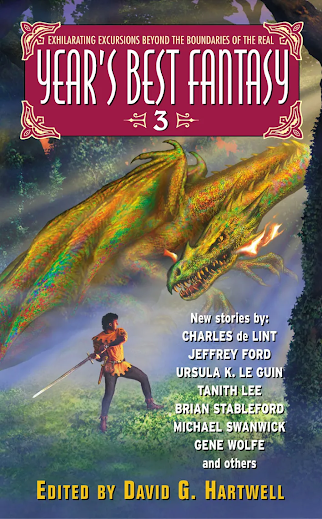In an ongoing effort to be as irrelevant as possible, I'm going to review the anthology I'm currently reading, Year's Best Fantasy 3 edited by David Hartwell...which was published 20 years ago. I haven't finished it yet, but I'm going to do a rolling review of the individual stories as I go.
These stories were first published in 2002. If these were, indeed, the best fantasy stories published that year, then the fantasy genre was almost entirely dead. They weren't, of course. They were just the ones most politically fashionable. It was not nearly as bad then as it is now, but SJW corruption of science fiction and fantasy was already well underway.
I have no doubt that with money and time, I could create an equally long collection (~490 pages) of actually good, actually fantasy stories that would sustain an actual fanbase. Of course, if I understand correctly, Amazon has destroyed the ebook market, but that's a separate question.
So, on to the stories.
First thing I did was browse the table of contents. I saw "Cecil Rhodes in Hell" by Michael Swanwick near the end. It was only a single page. I had an idea what I was in for, and I was curious, so I skipped to that.
This could barely be called a story. It is basically an encyclopedia entry (Wikipedia before that existed, kiddies) with a "white people bad" moral tagged on at the end. I am not kidding. It is garbage and the only reason anyone would publish it is because of a sick, seething hatred of white people.
Also, for anyone who wants to engage with the real world, Zimbabwe (formerly Rhodesia) is not doing well at all since they decided to kick out all of their white farmers, confiscate their land, and hand it over to blacks. Good. I hope they starve.
Going for a more standard reading experience, I returned to the beginning of the book for Kage Baker's "Her Father's Eyes." This is a story told from the point of view of a young girl on a train ride in post-World War II America. It is atmospheric and tense, and...debatably fantasy. There is nothing here that is absolutely distinct from our own world. It might be a fantasy story, but it could very well be just...bad people.
I hate these it-might-be-fantasy stories. If you're going to sell it as fantasy, make it fantastic, not, "might be fantasy, might be mental illness or a child's misunderstanding of the world."
It's not a bad story, but is it fantasy? Is it the best fantasy?
Next up "Want's Master" by Patricia Bowne, which is about academic politics and fundraising and growing old slightly dressed up in magical terms. Instead of taking us out of our own world into something exciting and fresh, Patricia opted to make magic boring and petty as office politics and gladhanding to raise money.
"October in the Chair" by Neil Gaiman - The months of the year convene to share stories. It's a cool setup. The personifications of the months are interesting. The story October ends up telling is a self-indulgent gamma poor-persecuted-me fantasy...in the worst sense of that word.
"Greaves, This Is Serious" by William Mingin - A send-up of P.G. Wodehouse's Jeeves stories. He makes a fair point, but it's fundamentally a mean-spirited shot at a much, much better writer, and, once again, barely qualifies as fantasy.
"Shift" by Nalo Hopkinson - Before I get to the story, I want to quote a bit from the author bio, "She is on the steering committee of the Carl Brandon Society, which promotes the involvement of people of color in speculative fiction." So yeah, you know what to expect.
In fairness, this is actually pretty well-written. It is, however, vile poison. It takes up the story of Shakespeare's Caliban centuries later. Caliban is a black man. When she arrived at the island, Miranda was so taken by this black man that she immediately decided to have sex with him, and then her father caught them and she accused him of rape.
Literally the entire point of the story is that white girls are desperate to get with black men, and somehow, it's white girls' fault that black men abandon those children. And black men are poor, persecuted victims of white people's perceptions who never did nothing wrong.
On behalf of the tens of thousands of white women in the U.S. raped by black men since this story was written, burn in Hell, Nalo. Burn in Hell.
And that's what I've read so far. It's gotten far worse since, but as you can see, our culture has been in deep trouble for some time now. There are also stories by Tanith Lee and Gene Wolfe in here, so there may be other worthwhile ones. I'm going to keep going, but, geez, this is bad.

No comments:
Post a Comment